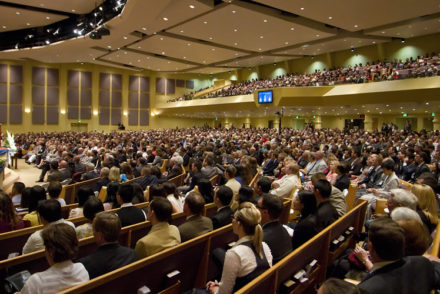Community vs. Biblical Community
Community is all the rage in churches today. While this is commendable, it should not be the ultimate goal. Biblical Community must be pursued.
All churches should aim towards biblical community. Some will at least accomplish community, but most churches do not accomplish either.
In this article I hope to define biblical community and provide 6 Key Traits of Biblical Community from 1 Thessalonians 2:1-12.
If your church intends to have biblical community, they should begin to employ these traits in whatever system of groups they have.
This article is not arguing for a certain type of group. Whatever system your church has – Sunday School, Small Groups, Community Groups or Missional Communities – all of them should have these six traits in order to achieve biblical community.
Biblical community is a community of Christians that are centered around the gospel of Jesus Christ, seeking to carry out the mission of Christ.
Biblical community is not quick conversations in passing at church or simply attending a group in the church. If you want true biblical community, you have to pursue it. Meeting once per week to discuss the sermon is not biblical community. Meeting once per week to hang out and play board games is not biblical community. While these things are helpful for community, real biblical community begins with the gospel of Jesus and expresses itself outward to the lost world.
1 Thessalonians 2:1-12 is likely one of the best passages in the Bible speaking to biblical community. Paul unpacks his love for the people in Thessalonica and gives 6 Key Traits of Biblical Community.
The first key trait comes from the middle of the passage, but is the foundation of all biblical community.
(1) The Glory of God
The first key trait of biblical community is that their ultimate aim is the glory of God. (v. 6, 10)
In verse 6 we see that Paul and his group are adamant not to receive glory for themselves. Though they could have sought glory or made demands as apostles, they neglected to do this. Another piece of evidence showing that Paul and his group seek the glory of God in their community is from verse 10. Paul writes of their holiness, “You are witnesses, and God also, how holy and righteous and blameless was our conduct toward you believers.”
If our churches are truly seeking to have biblical community, then the glory of God must remain primary. Our personal glory or preferences must be set aside. Everyone in the community must faithfully pursue the glory of Jesus.
(2) Willing to Endure Any Obstacle
The second key trait of biblical community is they are wiling to endure any and every obstacle. (v. 1-2)
In verse 1 Paul writes that his coming to the Thessalonians was not in vain. Paul knew that it served a greater purpose. And as verse 2 states that even though they had, “suffered and been shamefully mistreated” they were willing to endure all this to be in community and declare the gospel to them.
Groups will experience hardship. All groups do. In most cases when difficulty occurs, few people in the community have resolutely decided that they will stick in the hard times. True biblical community endures all obstacles. This puts the glory of Jesus on display to the whole world. It shows the world that this community is willing to bear hardship for Jesus!
(3) Gospel-Centered and Mission-Driven
The third key trait of biblical community is that they are centered on the gospel of Jesus Christ and driven to fulfill the mission of Jesus. (v. 3-4)
In verse 4 Paul writes, “just as we have been approved by God to be entrusted with the gospel, so we speak…” Paul is stating that the reason he speaks the gospel to others is because he realizes that he has been “approved by God” – forgiven completely – and “entrusted with the gospel” – sent on mission. Paul notes that the weight of being entrusted with the gospel should always send Christians out to share the gospel. Notice, the entrusting of the gospel by God comes from already having been approved. Amazing!
Genuine biblical communities must be serious about the gospel. It must be faithfully proclaimed to both the believers in the group for sanctification and unbelievers the group knows to fulfill the mission of Jesus. This is one of the primary reasons they exist.
The gospel carries biblical communities and they carry the gospel.
(4) Give, Not Get
The fourth key trait of biblical community is that their dominant mindset is to give to the group, not get.
In verse 5 Paul writes, “we never came with words of flattery, …nor with a pretext for greed.” This illustrates Paul’s dominant mindset in regard to community. Paul suggests that he did not enter the city with greedy motives. He was not seeking to receive anything from them; on the contrary, all he wanted to do was serve and give.
Healthy biblical communities will seek to give to their community, not get from them. This does not mean that your group will never serve you. Of course they will! But the dominant mindset of each member of the group is that they are seeking to serve and not be served.
As Acts 20:35 states, “Remember the words of the Lord Jesus, how he himself said, ‘It is more blessed to give than to receive.’”
What can you give to your group?
(5) Love For Others
The fifth key trait of biblical community is they have a selfless love for others. (v. 8-9)
In verse 8 Paul uses an amazing phrase to describe how he cares for the Thessalonian church. He writes that he is “affectionately desirous” of them. This is astonishing language! How many people do we think of in this way? Paul says this is how he feels about this church!
This love that Paul has is not just words. Paul puts feet to these words in verse 9. He writes that they labor and toiled and did not want to “be a burden to any of you, while we proclaimed the gospel of God.” This is love in action.
Are you willing to love everyone in your group selflessly? Are you willing to give up your days and nights for people? Do you love the people in your group so much that you would characterize the way you feel about them as “affectionately desirous?”
(6) Share Your Soul
The sixth key trait of biblical community is they vulnerably share their soul with each other. (v. 8)
Paul writes in verse 8, “we were ready to share with you not only the gospel of God, but also our own selves, because you had become very dear to us.” The word, “selves” is the Greek word psukā. This is more accurately translated “soul.” Paul is writing that he is willing to share his soul with them. This means that he is willing to be vulnerable. He is willing to share how his walk with Christ is going. He is willing to share the sins he is struggling with and ask for prayer. He shares his soul.
Paul writes that he was willing to share his own soul with these people having only ministered there for a few weeks. This is how God’s economy works.
Deep, meaningful relationships are at the heart of Christianity and biblical community. Where the gospel flourishes, people share their own souls.
Who are you sharing your soul with in your community?
As you go forward in seeking biblical community in the groups in your church, make the glory of God your aim. Make your groups gospel-centered and mission driven. Be willing to endure any obstacle to make biblical community happen. Out of deep love for each other, share your soul with others seeking to give more to the group than receive.





No Comments